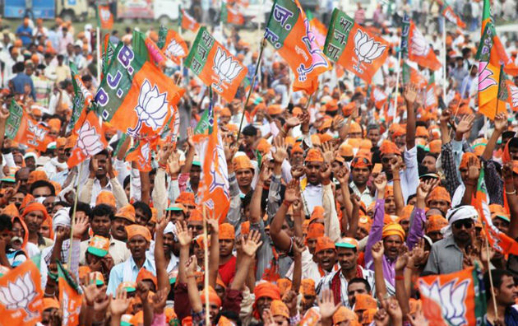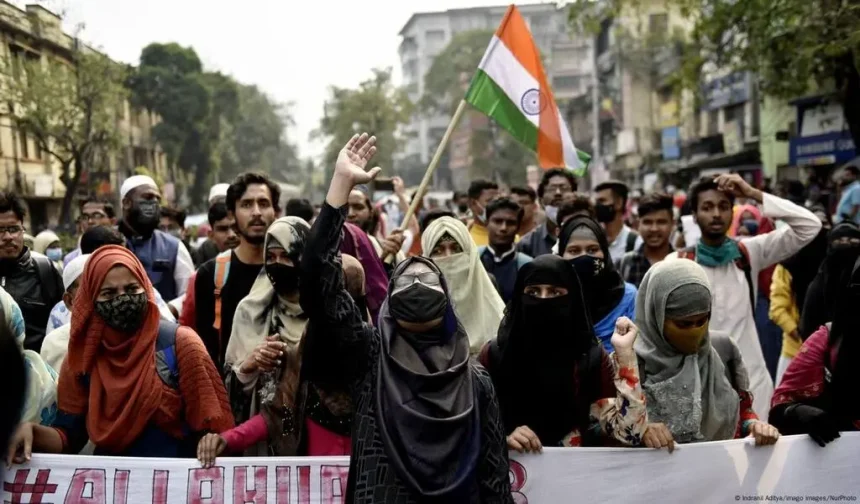(CTN News) – Muslims continue to face persecution in India, despite the recent electoral defeat of the Hindu nationalist Bharatiya Janata Party (BJP), the source of anti-Muslim hatred and violence.
The BJP failed to obtain a majority and had to rely on the backing of a number of secular regional parties to establish a government. It was thought that having fewer MPs in India’s Parliament would chasten the BJP and its new “secular” allies, putting a brake on the party’s anti-Muslim policy.
Just over a month after the new government was formed, such expectations have already been dashed. Following the election, authorities in BJP-led states, including the police and civil administration, began devising new techniques to harass, humiliate, and attack Muslims.
Impact of BJP’s Policies on Muslims in India
The most recent example comes from Uttar Pradesh, the BJP-ruled state with the most MPs in Parliament.
Earlier this month, state police issued orders requiring eateries and even roadside food carts along a route used by thousands of Hindu pilgrims each year to post the identities of their owners and personnel on display signs.
The police said that the order was issued to “help pilgrims” who go to sacred sites during the holy month of Shravan avoid purchasing food from outlets that may be offering products that do not adhere to the holy conduct that they must observe during their trip.
The states of Uttarakhand and Madhya Pradesh immediately followed suit, issuing similar laws requiring all of their businesses to prominently display the names of their owners and staff. \The officials in the city of Ujjain, Madhya Pradesh, an important Hindu pilgrimage destination, went so far as to declare that individuals who did not follow the order would face severe penalties.

This is, of course, more than simply an innocent policy “helping” Hindu pilgrims stick to their vegetarian diet; it is also a brilliant technique of identifying Muslim-owned establishments and ensuring that Hindus do not patronize them.
The authorities dispute that the regulation discriminates against Muslim firms, arguing that it is “religion neutral”. They claim that the new rule does not target any specific religious group, but they do not explain how knowing the identities of a restaurant’s owners and staff assists Hindu devotees in determining if it offers food that meets their dietary needs.
According to the police, previous cases of restaurant owners “hiding their identities” produced “confusion” in the minds of Hindu devotees, resulting in “law and order problems”. According to the authorities, some Muslim business owners gave their establishments Hindu-sounding names, and when some pilgrims discovered that the owners or personnel were Muslim, they were violent. The police argue that forcing all company owners and restaurant personnel declare their names up front will avoid chaos and violence.
This is a bizarre argument. If Hindus are causing trouble because of their perceptions of the identities of a shop’s owner and staff, why should Muslims take action to avoid additional aggression? And how will revealing the identities of the owners and employees of a certain diner clear the Hindus’ minds?
McDonald’s, for example, provides franchises to both Muslims and Hindus throughout India, yet each location serves the same menu. Is there a difference, in terms of consumer perception, between a McDonald’s outlet owned by Ram and one owned by Rahim Ali? Does the identity of the owner or servers at any particular branch influence the content of the cuisine on offer?
This new rule is clearly intended not to assist Hindu pilgrims in avoiding consuming food that violates the holy conduct they are expected to follow in some inexplicable confusion, but rather to encourage them not to visit Muslim-owned establishments with the implicit assumption that any food they consume in such a place will somehow pollute their bodies.
To bolster their case, supporters of the new law resurrected old misinformation that Muslims “sell food items after spitting on them” and “deliberately mix impure things in the food to defile Hindus”. They attempted to explain the police orders by claiming that Muslims cannot be trusted to adhere to food hygiene standards, and so Hindus have the right to know if an eatery is operated by one of them.
These policies requiring restaurant and food cart owners to declare their names are, at their heart, a state-sponsored encouragement of Hindus to boycott Muslim enterprises, including Hindu-owned ones that employ Muslim labor.
The ruling sparked outrage, but the Uttar Pradesh government stood firm, stating that the mandate would apply not only to companies along the pilgrimage route, but to all establishments in the state. Other governments later followed Uttar Pradesh’s lead, expanding the scope of their orders.

The case was shortly taken to the Supreme Court. The bench attempted to make sense of the police orders. The justices asked if the authorities wanted to know the identify of the farmer who grew the wheat or rice used to create the food products served along pilgrimage routes.
After all, Ramsharan, a Hindu, can easily sell vegetables cultivated by Rahmat Ali, a Muslim! How far can one go to ensure the sanctity of food? One of the judges went so far as to describe his experience of preferring a Muslim-owned eatery over a Hindu-owned eatery to guarantee international hygiene requirements were met.
The Supreme Court ruled against forcing businesses to reveal their owners’ identities and halted the controversial police directives. The judges ruled that, while restaurants may be required to state the type of food they offer, including whether it is vegetarian, they “must not be forced” to show the names and identities of their owners or staff.
Despite being temporarily postponed, the police orders issued to restaurant owners and employees delivered a clear message to India’s Muslims: the authorities in this country will never pass up an opportunity to persecute you because of your identity.
Indeed, the BJP’s strength and authority are linked to the ongoing persecution of Muslims. If they are unable to kill Muslims in sufficient numbers, they will force them into poverty by attacking their livelihoods – all in order to convey to their Hindu supporters that they are battling to maintain their social superiority.
The Role of Halal Certification in the Lives of Muslims in India
This is why, while forcing businesses to reveal their owners’ identities, the authorities also outlawed halal certification. Observant Muslims must know whether the products they use that contain animal products, such as cosmetics, are halal or not. It is critical for observant Muslims to understand whether alcohol or materials related to banned animals were utilized in the production or processing of the medicines or cosmetics they consume.
What objections might one have regarding Halal certification? It does not interfere with non-Muslims’ religious practices. It has little bearing on Hindus’ daily life. Does the sight of halal certification degrade BJP supporters?
What possible purpose could there be for prohibiting halal certification and compelling Muslim store owners to expose their identity than making Muslims’ life more difficult?
Many commentators are confused by India’s new cycle of violence and persecution of Muslims. They felt that the BJP’s lower strength in Parliament would force it to reflect and discipline itself. Instead, it has become more blatant and aggressive.
This is thought to be the product of internal power struggles inside the BJP. Some argue that Prime Minister Narendra Modi is attempting to shift responsibility for electoral defeats to state leaders such as Uttar Pradesh Chief Minister Yogi Adityanath.
The argument goes that by increasing the persecution of Muslims in his state, Adityanat is communicating that he is more brutal and committed to the cause than Modi, and thus deserves his position. This line of argument is probably true.
Not only in Uttar Pradesh, but throughout the BJP-led states, it appears that officials are competing to put more pressure on Muslims to establish their Hindu nationalist credentials and solidify their places within the party.
Unfortunately, when it comes to the BJP, even huge election upsets and internal power struggles appear to result in increased violence against Muslims rather than more sensible government.
Today, we are witnessing a renewed attack on Muslims in India, since the BJP’s ideology is fundamentally anti-Muslim and anti-Christian, and it cannot exist without inflicting violence on these minority populations. Muslims and other minorities will continue to face attacks in India as long as the BJP is in power, whether alone or as part of a coalition.
What is more disturbing today, aside from the party’s ongoing incitement of violence against Muslims, is the renewed willingness of all state agencies, like as the police and civil administration, to carry out these ideologically motivated attacks.
They are now aggressively harassing, persecuting, and discriminating against Muslims without being obliged to do so by political leaders. This means that Muslims would face more urgent and serious threats in their daily lives throughout this new age in India.
Source: Al Jazeera














